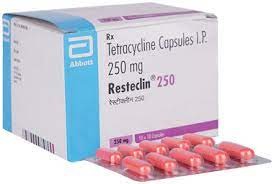A nurse is caring for a client who is prescribed tetracycline 2 grams daily PO in four divided doses every 6 hr. Available is tetracycline 250 mg capsules. How many capsules should the nurse administer per dose? (Round the answer to the nearest tenth. Use a leading zero if it applies. Do not use a trailing zero.)
The Correct Answer is ["2"]
To calculate the number of capsules that the nurse should administer per dose, the nurse should first divide the total daily dose of tetracycline by the number of doses per day. This gives the dose per administration:
2 grams / 4 doses = 0.5 grams per dose
Next, the nurse should convert the dose from grams to milligrams, since the available capsules are in milligrams. There are 1000 milligrams in one gram, so the nurse should multiply the dose by 1000:
0.5 grams x 1000 mg/g = 500 mg per dose
Finally, the nurse should divide the dose in milligrams by the strength of each capsule, which is 250 mg. This gives the number of capsules that the nurse should administer per dose:
500 mg / 250 mg/capsule = 2 capsules per dose
Therefore, the nurse should administer 2 capsules of tetracycline every 6 hours to the client.

Nursing Test Bank
Naxlex Comprehensive Predictor Exams
Related Questions
Correct Answer is D
Explanation
A. "It doesn't really matter what time you take your medications as long as you don't skip any doses."
While it's important not to skip doses, taking medications at specific intervals is often necessary for maintaining therapeutic blood levels and optimal treatment outcomes. Disregarding specific timing can affect the effectiveness of the medications.
B. "We'll have to talk to your provider about switching to an alternative schedule."
This response may not consider the client's preferences and might not be necessary if the client's current schedule can be adjusted to suit their routine. Collaboration between the nurse and the client is essential.
C. "You really shouldn't change the schedule we established here in the facility."
While continuity in medication schedules is important, if the established schedule doesn't align with the client's daily life, there should be flexibility to adjust it in a way that still maintains the effectiveness of the medications.
D. "Let's work together to devise a time schedule that is convenient for you on a daily basis."
Explanation: It's important to consider the client's lifestyle and routines when developing a medication schedule to ensure optimal adherence. Collaboratively working with the client to create a schedule that fits their daily activities increases the likelihood that they will consistently take their medications as prescribed.
Correct Answer is ["2"]
Explanation
The nurse should administer 2 tablets of olanzapine 10 mg orally-disintegrating tablets per dose.
Here's the calculation:
20 mg (desired dose) ÷ 10 mg (strength of each tablet) = 2 tablets
So, the nurse should administer 2 tablets of olanzapine 10 mg orally-disintegrating tablets per dose.
Whether you are a student looking to ace your exams or a practicing nurse seeking to enhance your expertise , our nursing education contents will empower you with the confidence and competence to make a difference in the lives of patients and become a respected leader in the healthcare field.
Visit Naxlex, invest in your future and unlock endless possibilities with our unparalleled nursing education contents today
Report Wrong Answer on the Current Question
Do you disagree with the answer? If yes, what is your expected answer? Explain.
Kindly be descriptive with the issue you are facing.
